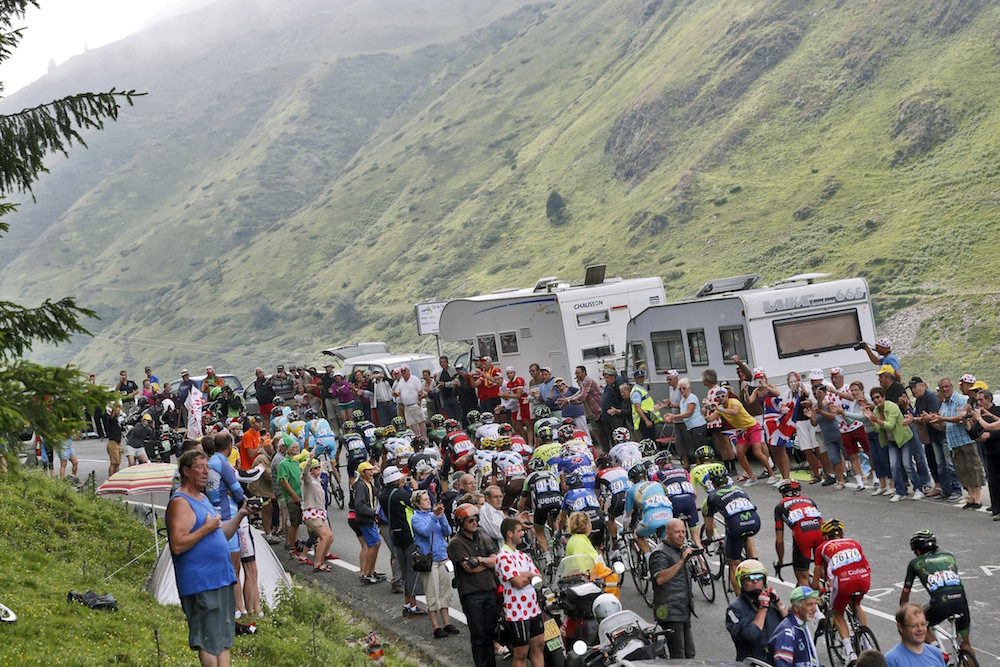Band of brothers: How the sprinters survive in the Tour de France mountains
When the Tour de France hits the mountains, for some riders all they can do is survive

Riders on the Col du Tourmalet during Stage 18 of the 2014 Tour de France (Watson)
When it comes to the Tour de France, safety in numbers is certainly the key motto.
If you’re at the front of the race you fight to have as many teammates around you as possible to keep you safe from your rivals.
But even at the back end of the field there is solace to be taken by surrounding yourself with your fellow riders, and as the race hits the mountains for the first time the sprinters are accepting their fate as the perennial hangers-on.
Mark Cavendish has prospered in the first week when the routes have been flat, but now the roads are starting to point upwards and the stage profiles begin to look like sharks’ teeth the game turns to surviving at the back of the race.
The sharks are constantly nipping at the back wheels of the strugglers in the mountains, with the sprinters usually the first to be cast adrift.
But the gruppetto, as the final group on the road is known, won’t let themselves simply drift off into the abyss, instead they fight for survival against the time limit imposed by the race jury.
“Mentally it’s a lot more relaxed than sprint stages, but of course physically it’s going to be super hard. The next two days it’s going to be hard to stay within the time limit,” said Andre Greipel (Lotto-Soudal) of stages eight and nine.
The latest race content, interviews, features, reviews and expert buying guides, direct to your inbox!
“[You have to] hang on as long as possible and try to have a big group. At the end it all comes down to all of us who are in trouble on the climbs. If we stay together we have a much better chance. Everyone should be fair to each other and honest with each other.”
>>> Giro d’Italia gruppetto ‘racing full gas from the start to make the time cut’
With five Tour de France starts to his name, Greipel knows exactly what to expect from the mountain stages. There is light at the end of the tunnel after all, with stage 11 to Montpellier offering another opportunity for the fast men.
Getting there won’t be an easy task for Irish sprinter Sam Bennett (Bora-Argon 18), who has fought to survive in recent days after a stage one crash left him requiring stitches on a finger on his right hand.
Bennett believes he can hang with the gruppetto on the long climbs, but in his current state he isn’t able to get the explosiveness on the short climbs to stay with the group.
“You’ve just got to stay within your limits; not go too hard on one stage because you’re going to pay for it on another one,” he said.
“Last year I had no condition, but I could go into the red. This year I have condition but I can’t go into the red, so it’s a bit different.”
A look ahead to the Pyrenean stages of the Tour de France
Today’s breed of sprinter also isn’t like the sprinters of yesteryear, who abandoned when the race hit its first real climb. Riders like Alexander Kristoff (Katusha) and Peter Sagan (Tinkoff) shun the notion of being useless when the road points upwards.
“We have many guys in my position and I even climb better than them,” Kristoff said.
“I’m not always on the limit in the last group, I can even hang with the [main] group a bit longer if I really want. I try to save energy and go with the latest group that I feel safe in.”
He added: “The new guys should just hang around with the big sprinters, because they know what they are doing. They’ve done it many times so they know how much time there is to lose.”
The 2016 Tour de France has got through seven stages without losing a rider – the first time that has happened in history – but surely that record will be tested in the next mountain stages.
Stuart Clarke is a News Associates trained journalist who has worked for the likes of the British Olympic Associate, British Rowing and the England and Wales Cricket Board, and of course Cycling Weekly. His work at Cycling Weekly has focused upon professional racing, following the World Tour races and its characters.